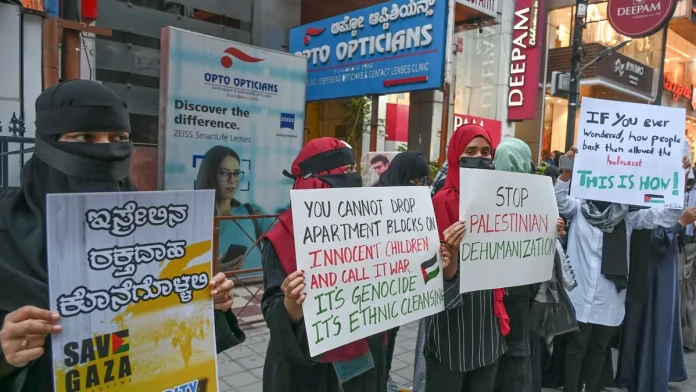In a disturbing trend, pro-Palestinian protests and social media posts have been met with severe crackdowns across India since the outbreak of the Israel-Hamas war in October 2023. At least seven Indian states have filed criminal cases against demonstrators, citing various sections of the Indian Penal Code (IPC), the newly introduced Bharatiya Nyaya Sanhita (BNS), and even the stringent Unlawful Activities (Prevention) Act (UAPA). This response has sparked concerns over freedom of expression, as well as India’s shifting stance on the Israel-Palestine conflict, says an investigative report of Article 14.
The Crackdown: 17 FIRs, 51 People Booked
Since the conflict began, Indian authorities have filed 17 First Information Reports (FIRs) across states like Uttar Pradesh, Bihar, Karnataka, Maharashtra, and Jammu & Kashmir. These cases involve at least 51 people, ranging from students and shopkeepers to protesters waving Palestinian flags during religious processions. In total, 14 FIRs were related to participation in protests, while three targeted individuals for pro-Palestinian social media posts.
In one of the most serious incidents, a young man in Uttar Pradesh was arrested under the UAPA for waving a Palestinian flag during a Muharram procession. Other cases involved charges such as disobedience to public orders, creating a public nuisance, and promoting enmity between different groups. The actions of the police, especially the use of anti-terror laws for peaceful protests, have raised alarm among civil rights activists and legal experts.
Protests and Arrests Across India
The crackdown has been widespread. In Bengaluru, Karnataka, police detained 25 protesters for gathering in solidarity with Palestine, arguing that they had violated court orders restricting protests to specific areas. Protest organizers were charged under several IPC sections for unlawful assembly and causing public obstruction. Similar actions were taken against protesters in other states, where public displays of support for Palestine were met with detentions, arrests, and even warnings of severe consequences.
In Aligarh, Uttar Pradesh, four students of Aligarh Muslim University (AMU) were booked for participating in a pro-Palestinian march on their campus. The police justified the action by claiming that the protest had “provocative slogans” and lacked official permission. Protests in Bihar and Madhya Pradesh were also curtailed, with the police arresting several individuals for waving Palestinian flags during Muharram processions, alleging that the flags were “banned” or that such displays amounted to “anti-national” activities.
Growing India-Israel Ties
The clampdown on pro-Palestinian protests coincides with India’s deepening ties with Israel, especially under Prime Minister Narendra Modi’s government. Since coming to power in 2014, Modi has strengthened diplomatic, economic, and military relations with Israel, culminating in his landmark visit to the country in 2017 – the first by an Indian Prime Minister. Today, India is Israel’s largest buyer of defense equipment, and the two nations have signed several key agreements in technology, agriculture, and security.
This growing bonhomie between India and Israel has, however, come at a time of rising Islamophobia and anti-Muslim rhetoric in India. Many see the government’s crackdown on pro-Palestinian protests as part of a broader agenda that seeks to silence dissent, particularly from Muslim communities, and restrict the freedom to speak out against Israel’s actions in Gaza.
The Legal and Humanitarian Angle
India’s position on the Israel-Palestine conflict has historically been in favor of Palestine, with the country being one of the first non-Arab nations to recognize the Palestine Liberation Organization (PLO) in 1977 and the Palestinian state in 1988. However, the Modi government’s official stance has been one of cautious diplomacy, balancing its support for Palestine with its strategic relationship with Israel.
Despite this diplomatic balancing act, the government’s internal handling of pro-Palestinian sentiments suggests a tightening grip on free speech. Legal experts argue that the arrests are unconstitutional. Senior advocate Colin Gonsalves has called the arrests illegal, saying, “Protesting against Israel’s actions is part of freedom of speech and expression. You can’t book someone for exercising this right.”
The humanitarian toll of the Israel-Palestine conflict has been immense. Since October 2023, over 40,000 Palestinians have lost their lives, and tens of thousands have been injured in the Gaza Strip, as Israeli airstrikes continue to devastate the region.
Wrapping up
The criminalization of pro-Palestinian protests and social media posts in India marks a worrying trend for civil liberties in the country. As the conflict in Gaza escalates, the Indian government’s approach appears to be one of silencing dissent rather than encouraging open dialogue. The use of anti-terrorism laws like the UAPA for peaceful demonstrations is particularly troubling and sets a dangerous precedent for freedom of expression in the world’s largest democracy. The global community watches as India, once a champion of the Palestinian cause, navigates a complex new reality – one where its foreign policy interests and domestic political dynamics increasingly clash with its historic principles of justice and human rights.




